Russian River Water Update 6/20/23
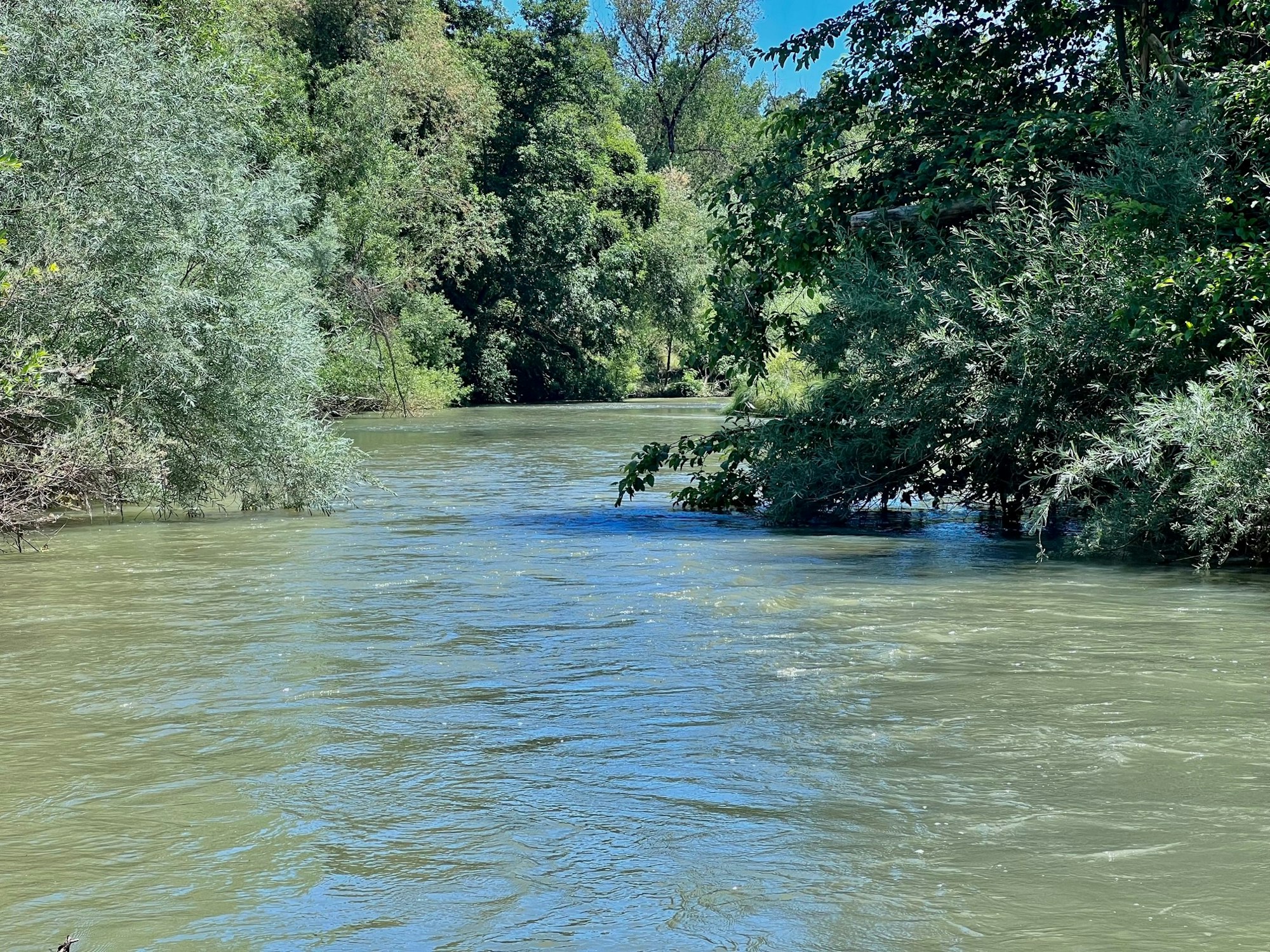
Reservoir Storage & Operations:
Water supply information provided by Sonoma Water (more info here).
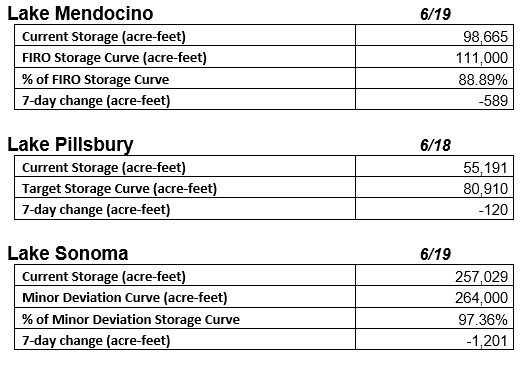
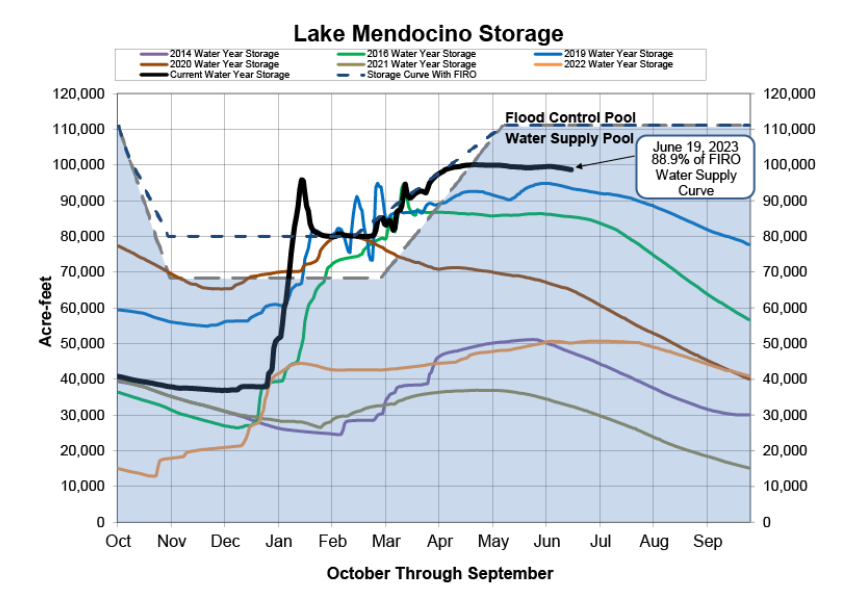
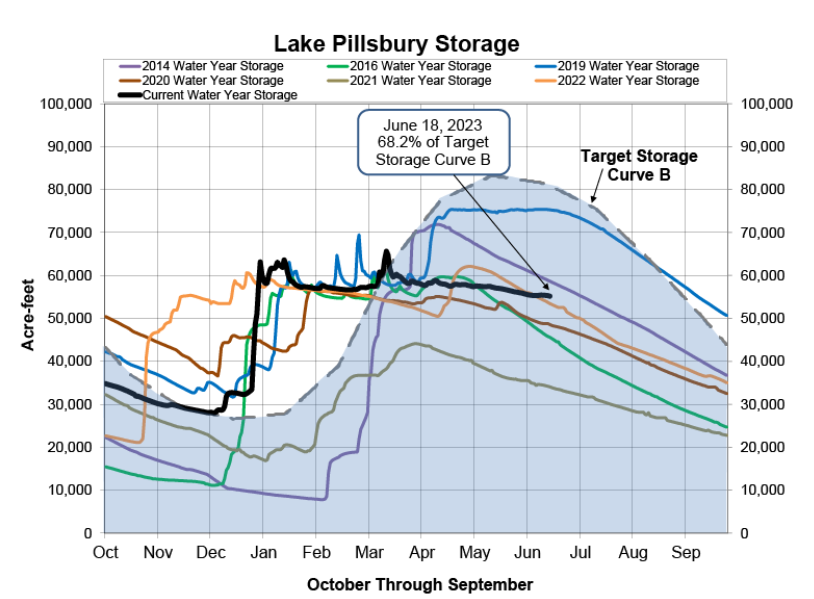
Russian River Water Forum Updates
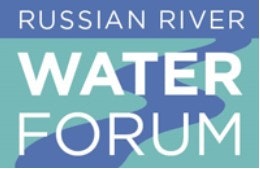
The Russian River Water Forum Planning Group held its second meeting on Monday, June 12, 2023. You can find the slides and recording on the website here, under Meeting #2. A summary is being developed by the facilitators and available soon. The public is welcome to join a series of technical briefings on zoom. More information can be found on the website. Future Planning Group meetings are listed on the website.
Webinar: Solutions in Soil; From Science to Practice

Throughout the Solutions in our Soil webinar series, what soil health means and why it’s so important, how it’s connected to water, and where we can promote soil health throughout the food supply chain has been explored. For the fourth and final webinar, we'll speak with growers to hear how they implement soil health practices on the ground and how soils are integral to climate-resilient agriculture.
Join on Thursday, June 29 from 10:00 – 11:00 AM for the last webinar in our spring series, From Science to Practice to hear from expert panelists, Katie Chiapuzio of Braga Fresh and Justin Wylie of Wylie Farms, and learn how they’re turning science into practice to nourish both our communities and our environment. Register Here
What Can Recharge Do For You?
“Groundwater recharge efforts in Fresno Irrigation District (FID) could be one of the reasons the region tends to command higher farmland values than neighboring areas.” “Even before SGMA, we recognized in the early 2000s … that we needed to start building recharge basins, capturing storm water, and keeping that water within the district….”Western Farm Press: Ag land values benefit from recharge, runoff, 6/9/23
"Planning for future dry conditions is critical to protecting our communities, health, and our environment,” said California Secretary for Environmental Protection Yana Garcia. “The state has taken unprecedented action to leverage the benefits of our recent wet weather by replenishing our groundwater resources through recharge, and we look forward to achieving even more progress in the future with partners across the state. This is just one example of how our state is creating a more resilient water supply for all Californians in the face of climate-driven weather extremes.” State Water Board: Over 1 million acre-feet of water authorized for, 6/7/23
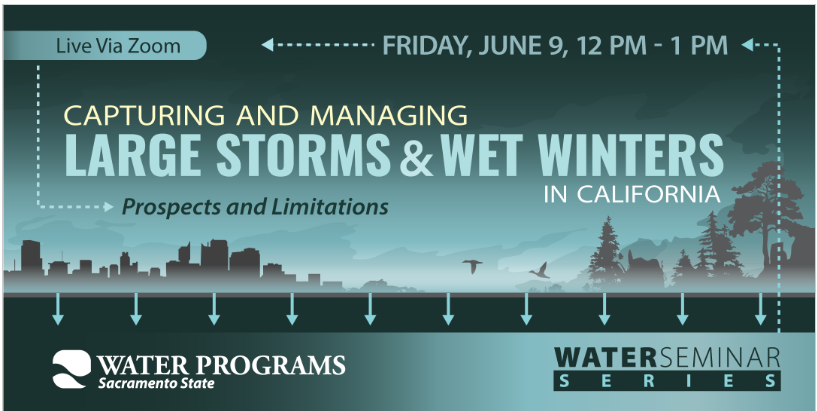
Capturing water from wet periods for use in drier seasons or years has been central to California's water management since the early 1900s. Reservoirs and aquifers are routinely used for this purpose by many agencies and regions. How much more water can be saved in wetter times for later use? How much would this cost? What are the potential environmental costs (and benefits) of storing additional water? This talk will review the use of water storage in California, the potential and limits for expanding water storage, some policies that might help expand water storage, and the likely effects of climate change on the value and ability to store water for drier seasons and years. The recording of the webinar is available here.
State Water Board to Host Virtual Forum on Decision-Support Frameworks for Climate and Racial Equity in Water Boards Programs

Monday, July 17, 2023, from 1:15 p.m. to 4 pm on Zoom; register here
The Water Boards have a shared mission to preserve, enhance, and restore the quality of California’s water resources and drinking water. The Water Boards envision a California where people’s access to water resources and the quality of those water resources do not depend on their race and where Water Boards staff consistently apply a racial equity lens to decision-making. Current and future climate change hazards—such as more intense droughts, floods, and wildfires—threaten water supplies, access to drinking water and sanitation, groundwater conditions, and beneficial uses of California’s waters. Climate change affects communities and parts of the water sector in different ways and tends to disproportionately impact Black, indigenous, and people of color communities and communities in California with fewer resources. Climate change is a major challenge to the Water Boards’ mission and vision.
This forum will serve as an opportunity for input on how the Water Boards should prioritize climate action related to its mission. Researchers, advocates, and community organizations will share about tools, experiences, and recommendations that the Water Boards can learn from to address disproportionate climate impacts. Members of the public are invited to listen in, and there will be time for input and questions. This is the first public event to inform the early development of the Climate and Racial Equity Strategy (CARES), a State Water Board Racial Equity Action Plan commitment.
If your organization would like to be considered as a panelist for this or future State Water Board climate-related events or for any other questions about the forum, please contact the Climate Team at climate@waterboards.ca.gov and include “Climate Forum” in the subject.
The agenda will be posted online before the forum. The forum will be recorded and made available online. More information and updates will be added to the State Water Board Climate webpage at waterboards.ca.gov/climate.
State Water Board Ban on Decorative Grass for Business & Government Properties
The State Water Resources Control Board has readopted an emergency regulation that bans using drinking water for watering decorative grass (or non-functional turf which is mowed grass not used for recreational or other community activities) at commercial, industrial, and institutional properties. This applies to areas like grass in front of or next to large commercial buildings, and some common areas managed by homeowners’ associations. In addition to not applying to grass used for recreational or other community activities, the ban does not affect or prohibit watering residential lawns or trees. In fact, the state encourages people to keep watering trees because of their many environmental benefits. The ban also does not prohibit using recycled water for irrigating non-functional turf. Read more in the Sierra Sun Times article, 6/4/23
Learn More About: The CA Water Data Consortium
In this issue of the DWR Data News, you can read up on the Data Consortium’s creation, purpose, governance, funding, and more! The Consortium is a collaborative organization whose constituent groups
and members rely on one another for information and input to produce
inclusive and effective outcomes. The interrelationships among elements of
the governance structure are described below
More Russian River Photos:
Last year at the confluence of Morrison Creek and the mainstem Russian River, there was a large log jam, approximately 10 feet high and 100 feet long - impassible! The pictures below show how the winter storms brought flow strong enough to dislodge the log jam. Only one large tree remains across the mainstem, requiring canoes and kayaks to port around it on the gravel bank.


In the press:
- Courthouse News: West gets reprieve from drought, but forecasters predict change as El Niño approaches, 6/15/23
- The Signal : Garcia introduces bill to improve atmospheric river forecasting, 6/14/23
- New York Times via Yahoo News - Why Has California Been So Cloudy Lately?, 6/15/23
- Bloomberg via Business Standard: Return of El Niño threatens new levels of economic destruction, 6/14/23
- San Fran Chronicle GIFT ARTICLE: El Niño typically means wet California winters. These charts show what might be in store, 6/24/23
- Circle of Blue: Say Goodbye to Lawns in Drying U.S. West, 6/7/23
- USC Viterbi: Universities in California, Arizona, and Nevada Form Consortium to Address Clean Water Access and Sustainability Challenges, 6/8/23
- Union of Concerned Scientists: California Agriculture Could Use an Ancient History Lesson, 6/5/23
- LA Times: Californians were asked to cut water use 15% during the drought. How close did they get? 6/12/23
- LA Times: What the data says (and doesn’t say) about drought, 6/12/23
- NY Times via Yahoo News: California Is Living Between Ever-Widening Climate Extremes, 6/12/23
- BBC Crosscurrents: What it takes to restore and maintain an urban creek, 6/13/23
- NPR: One way to lower California's flood risk? Give rivers space, 6/14/23
- CA Water Blog: Facing the Dragon: California’s Nasty Ecological Debts, 6/11/23
